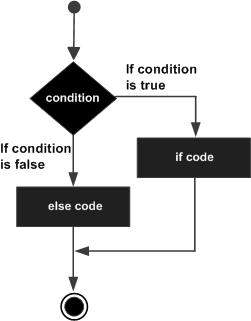C++ if…else语句
if 语句后面可以跟一个可选的 else 语句,当布尔表达式为false时执行。
语法
C++中if…else语句的语法为−
if(boolean_expression) {
// statement(s) will execute if the boolean expression is true
} else {
// statement(s) will execute if the boolean expression is false
}
如果布尔表达式评估结果为 true ,则会执行代码中的 if块 ;否则会执行代码中的 else块 。
流程图

示例
#include <iostream>
using namespace std;
int main () {
// local variable declaration:
int a = 100;
// check the boolean condition
if( a < 20 ) {
// if condition is true then print the following
cout << "a is less than 20;" << endl;
} else {
// if condition is false then print the following
cout << "a is not less than 20;" << endl;
}
cout << "value of a is : " << a << endl;
return 0;
}
当以上代码被编译和执行时,会产生以下结果−
a is not less than 20;
value of a is : 100
if…else if…else语句
一个 if 语句可以后面跟着一个可选的 else if…else 语句,在使用单个if…else if语句来测试多个条件时非常有用。
当使用if、else if、else语句时,需要牢记以下几点:
- if语句可以有零个或一个else,且必须在任何else if之后。
-
if语句可以有零个到多个else if,且必须在else之前。
-
一旦一个else if成功,剩下的else if或else将不会被测试。
语法
C++中if…else if…else语句的语法是−
if(boolean_expression 1) {
// Executes when the boolean expression 1 is true
} else if( boolean_expression 2) {
// Executes when the boolean expression 2 is true
} else if( boolean_expression 3) {
// Executes when the boolean expression 3 is true
} else {
// executes when the none of the above condition is true.
}
示例
#include <iostream>
using namespace std;
int main () {
// local variable declaration:
int a = 100;
// check the boolean condition
if( a == 10 ) {
// if condition is true then print the following
cout << "Value of a is 10" << endl;
} else if( a == 20 ) {
// if else if condition is true
cout << "Value of a is 20" << endl;
} else if( a == 30 ) {
// if else if condition is true
cout << "Value of a is 30" << endl;
} else {
// if none of the conditions is true
cout << "Value of a is not matching" << endl;
}
cout << "Exact value of a is : " << a << endl;
return 0;
}
当上述代码被编译和执行时,产生以下结果 −
Value of a is not matching
Exact value of a is : 100
 极客教程
极客教程